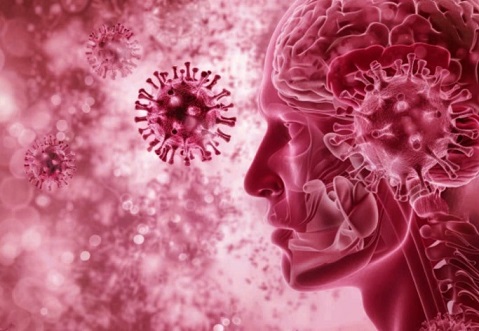Russian Study Reveals Concerning Diffuse Brain Changes in Acute and Post COVID-19 Phases
Nikhil Prasad Fact checked by:Thailand Medical News Team Feb 14, 2025 1 month, 3 weeks, 6 days, 1 hour, 23 minutes ago
Medical News: A new study conducted by researchers from the Research Center of Neurology in Moscow, Russia, and the Sklifosovsky Research Institute for Emergency Medicine, Moscow, Russia, has revealed that COVID-19 can cause significant changes in the brain, both during the acute phase of infection and long after recovery. Scientists have been investigating the long-term effects of the virus, particularly on the nervous system, and this latest research sheds new light on how COVID-19 may continue to impact brain health long after the virus has left the body.
 Russian Study Reveals Concerning Diffuse Brain Changes in Acute and Post COVID-19 Phases
Russian Study Reveals Concerning Diffuse Brain Changes in Acute and Post COVID-19 Phases
For many patients, neurological symptoms such as brain fog, headaches, memory problems, and even coordination difficulties have been reported during and after COVID-19 infection. However, the exact mechanisms behind these issues were not well understood until now. This
Medical News report highlights the critical findings from an autopsy-based study that examined the brains of individuals who had either died during the acute phase of COVID-19 or after recovering from the virus.
What the Study Found in the Brain
The study involved 15 deceased patients, 11 of whom had died during the acute phase of COVID-19 and four who had passed away weeks to months after recovering from the infection. The researchers focused on nine specific regions of the brain, including the cerebral cortex, hippocampus, brainstem, cerebellum, and olfactory system, to assess structural and molecular changes caused by the virus.
One of the most striking findings was the presence of widespread microcirculatory disorders, including small blood clots in the brain's tiny vessels, inflammation, and significant brain swelling. These changes were observed not only in patients who had died from COVID-19 but also in those who had recovered and later passed away from unrelated causes.
Additionally, the study detected accumulations of the SARS-CoV-2 S1 spike protein in various brain regions. While the viral N protein, which is essential for viral replication, was not found, the persistent presence of the spike protein suggests that fragments of the virus may linger in the brain for extended periods. This could explain why some individuals continue to experience neurological symptoms long after recovering from COVID-19.
The Brainstem and Cerebellum Were Most Affected
Interestingly, the most severe damage was observed in the brainstem and cerebellum. The brainstem controls vital functions such as breathing and heart rate, while the cerebellum plays a crucial role in balance and coordination. Researchers found that these areas had high levels of inflammation, microglial activation (a type of immune response in the brain), and significant deposits of the SARS-CoV-2 spike protein.
Moreover, the presence of amyloid-like deposits was noted, which may indicate a process similar to neurodegeneration. These findings suggest that COVID-19 might accelerate certain degenerative
processes in the brain, potentially increasing the risk of long-term neurological issues.
No Direct Evidence of Viral Replication in the Brain
Although researchers confirmed the presence of viral proteins in the brain, they did not find strong evidence that the virus was actively replicating within brain cells. This suggests that the neurological symptoms associated with COVID-19 may not be due to direct viral infection of brain tissue but rather a combination of inflammatory responses, vascular damage, and prolonged immune activation.
The study also showed that the severity of these brain changes did not necessarily correlate with the duration of the illness. This means that even patients who recovered from COVID-19 months earlier could still have lingering effects in their brain tissue.
Long-Term Implications for COVID-19 Survivors
The persistence of viral proteins in the brain, combined with ongoing inflammation and vascular damage, raises concerns about potential long-term neurological consequences. Many COVID-19 survivors report symptoms of "long COVID," including cognitive impairment, chronic fatigue, and even an increased risk of stroke. The findings from this study support the theory that COVID-19 may leave a lasting impact on brain function, even after the acute infection has resolved.
Additionally, the study suggests that damage to the blood-brain barrier - the protective layer that prevents harmful substances from entering the brain - could be a key factor in these persistent neurological symptoms. Once this barrier is compromised, it may allow inflammatory molecules, immune cells, or even residual viral components to enter the brain and contribute to ongoing damage.
Conclusion
This research provides critical insights into how COVID-19 affects the brain, both during and after the infection. The presence of microvascular damage, persistent viral proteins, and ongoing inflammation in the brainstem and cerebellum suggests that COVID-19 is not just a respiratory disease but also a neurological one with potential long-term consequences. The study highlights the need for further research to understand the full extent of COVID-19’s impact on the brain and to develop targeted treatments for those suffering from long-term neurological symptoms.
The study findings were published in the peer-reviewed journal: Russian Journal of Archive of Pathology.
https://www.mediasphera.ru/issues/arkhiv-patologii/2025/1/1000419552025011005
For the latest COVID-19 News, keep on logging to Thailand
Medical News.
Read Also:
https://www.thailandmedical.news/news/two-years-after-infection-covid-19-found-to-have-restructured-the-brain-making-it-dysfunctional
https://www.thailandmedical.news/news/sars-cov-2-infects-microglia-the-immune-cells-of-the-brain-affecting-long-term-cerebrum-health
https://www.thailandmedical.news/news/malaysian-researchers-find-that-long-covid-individuals-are-likely-to-have-executive-function-deficits-and-altered-brains
https://www.thailandmedical.news/news/impact-of-covid-19-on-blood-brain-barrier-and-alzheimer-risk
https://www.thailandmedical.news/articles/coronavirus
